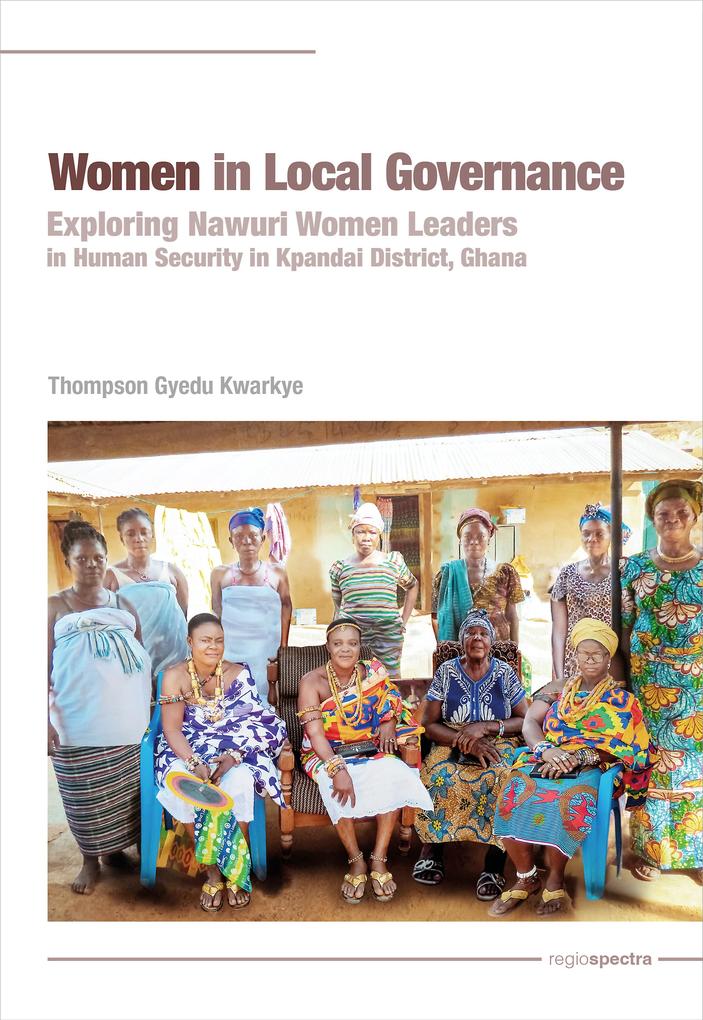How do women leaders adapt to changing global trends to remain active at the local levels? The book answers this question by uniting several strands of cultural inquiries that are linked to current trends of globalisation, democratisation and gender and feminist discourses. It assesses the intersectionality between tradition and modernity by placing women leaders (queen mothers, cult leaders, family heads) as active agents in human security.
Thus, Thompson Gyedu Kwarkye postulates an approach dubbed feminist securitization that emphasises how women leaders are adapting to changing global trends to remain active at the local levels. The approach also answers key conceptual questions related to women's leadership in a patriarchal system.
The research also explores colonial and decolonial discourses among Nawuri women leaders beginning in the seventeenth century. For Nawuri women leaders, colonialism came in many folds. First, in a form of racial subordination between the colonial government and the natives. Second, women leaders suffered from the segregation of highly centralised institutions and the segmented Nawuri. Third, it came through divisions based on gender that were apparent among Nawuri men and women. However, after 1957 women leaders became a pivot in local governance.
Inhaltsverzeichnis
Table of Contents
Summary vii
Acknowledgements xi
List of Figures xv
List of Abbreviations xvii
Chapter 1. Introduction to the Research 1
1. 1 General Introduction 1
1. 2 Locating the Study 11
1. 3 Methods and Fieldwork Settings 26
1. 4 Outline of the Dissertation 50
Chapter 2. Key Concetual Issues 53
2. 0 Introduction 53
2. 1 Power 54
2. 2 Authority 65
2. 3 Governance 76
2. 4 Security 84
2. 5 Summary of the Chapter 91
Chapter 3. Development of Nawuri Women s Leadership in the Kpandai District 95
3. 0 Introduction 95
3. 1 Origin and Organisation of the Nawuri 97
3. 2 The Nawuri and their Immediate Neighbours 106
3. 3 Nawuri Women Leaders 114
3. 4 1951: The Year Everything Changed 128
3. 5 Summary 132
Chapter 4. Nawuri Women Leaders in Human Security 135
4. 0 Introduction 135
4. 1 Profiles of Nawuri Women Leaders 138
4. 2 Core Conceptual Issues: Women Leaders in Human Security 146
4. 3 Nawuri Women Leaders and Human Security 151
4. 4 Challenges to Women Leaders in Himan Security 171
4. 5 Conclusion 177
Chapter 5. Collavoration, Partnership and Interaction: Nawuri Women Leaders in Local Governance 179
5. 0 Introduction 179
5. 1 Theorising Customary Structures in Local Governance 181
5. 2 General Overview: Exploring Model II at the National
and Regional Levels in Ghana 188
5. 3 Between Hierachies and Networks: Exploring Model V
in Kpandai 195
5. 4 Conclusion 214
Chapter 6. General Conclusion 217
6. 0 Aim and Scope 217
6. 1 Filling the Knowledge Gap 219
6. 3 Summary of the Main Research 224
6. 4 Towards an Empowerment Strategy 235
References 241
List of Interviews 273
Archival Documents 277
Appendix A: Interview Guide 279










